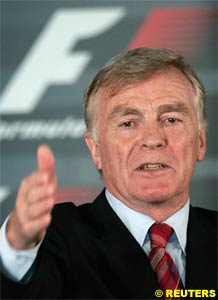Atlas F1 Magazine Writer
Fresh from the Formula One paddock
"Enigmatic, at best; confusing, at worst," was the response given over this weekend past by an old Formula One hand when asked his views on FIA President Max Mosley's recent double change of heart and mind. The respondent then volunteered an additional perspective: "It's all politics. Now that Max has been asked, make that "begged", to rescind his decision to step down, he holds all the aces. And he well knows it."
It was the second time that view had been aired within earshot of the Grapevine, the first time coming on the Friday evening in Magny-Cours after the former March team boss had famously declared that, as he was not a Formula One team principal, he did not change his mind, so, no, he would not be rescinding his decision.
The speaker on that occasion was a team principal of a contemporary outfit, one who certainly is amongst the "sharpest knives in the box"; one who is acknowledged as being as shrewd a judge of character as any in the pitlane; one who has survived in the sport for many years. He had proffered the same perspective as the old hand, but with a rider: "I bet Max will change his mind, stay on for a year, then he'll stand again..." Well, said team principal has scored two out of three so far, and will know within year whether he attains a full house.
The 'begging' at last Friday's extra-ordinary General Meeting in London, though, means he will see through, at the every least, his plans to slow down F1, making it safer than before, and, hope the likes the Eddie Jordan and Paul Stoddart, more cost-effective than of late. So, for the doubters: V8s of 2,4 litre capacity will rule the roost whilst rev-restricted V10s will make up the numbers, gizmos will go, aerodynamics will be clipped and tyres will increasingly become performance restrictors, not enhancers.
But, Mosley's about-turn will have rekindled flickers at the 'opposition': the GPWC, which, through its ongoing disputes with Bernie Ecclestone, was, by extension, in disagreement with Max Mosley, who, despite having chaired the FIA's Manufacturer Commission two decades ago, has not, of late, enjoyed many fire-side chats with its leaders. In fact, Mosley's close relationship with F1's commercial rights holder, one that has caused accusations that the men could well be 'joined at their hips', has been cited as a major contributor to the on-going disharmony between the factions.
So, whilst F1 will in future be 'dumbed-down' to foster its survival through lowering of costs and raising demands on driver skills, it could well face increasing pressures from within, demands brought about by those keen to see the billions the sport has generated since the inception of the latest incarnation of the Concorde Agreement in 1997 used to further its technologies and spectacles rather than servicing its masters – Ecclestone, and the banks who own 75% of the trust controlling F1.
Forget not that motor manufacturers (and component suppliers, be they providers of rubber, brakes, electronics or from whatever category) fund massive research and development programmes on continual bases, whether in F1 or not. So, whilst F1 may well be seen as marketing exercises by the likes of Fiat/Ferrari, BMW, Mercedes, Renault, Honda, Ford/Jaguar and Toyota (and Bridgestone and Michelin and the rest), it too is seen as complementary to their R&D programmes. And, this money will be spent, whether they compete in F1 or not. (Consider: do VW and GM not fund in-house R&D simply because they are not in F1?)
With 4WD, V10s, turbos, traction control, ABS, semi-automatic gearboxes, power steering and a whole raft of technological aids once a part of F1 now (or about to be) banned, punters are increasingly arriving at circuits in road vehicles far advanced on the very cars they have paid exorbitant sums to see/hear/feel. Arguments rage as to whether F1's spectators arrive to see sporting or technological contests, but why is one or the other; why cannot 120,000 bodies be turned on by both? And, if the fans hold no interest in technology, why then do they purchase road cars thus expensively equipped in the first instance?
So, with hi-tech research avenues via motor sport increasingly closing on them, those manufacturers wishing to maintain (or create) a competition presence, one showcasing their technology at the highest level, have but one option: to create a formula which allows them to showcase their technology in public contests whilst getting the sport's followers, whether on stands or in armchairs, to fund the technology via their interest. "Nothing like getting the public to fund our fun and R&D," goes the GPWC mantra.
In the very week that unification talks between CART and the IRL broke down – some say irrevocably – F1 faces a crucial test: whether or not Mosley's latest volte-face increases the GPWC's determination to go its own way. These talks, ironically sponsored by Roger Penske - once a customer of Mosley's at March and a man who 'changed his mind' about being an F1 team principal at around the time Mosley did - could well have seriously threatened F1's future had they been successful, for the likes of Ford and Toyota may well have committed to a single US-based open-wheeler category rather than be seen as losers in F1.
As matters stands now, though, manufacturers have two options: stick to a 'dumbed-down' F1, or go with a 'sexed-up' GPWC series. They could conceivably create a third option: wait until October, when the FIA Presidency faces mandatory elections, and act upon the outcome.
The latter seems the most likely route. So, once again, the GPWC has been forced to regroup, but, regroup it will, with the next 12 months deciding its direction. In the interim much lobbying will go on behind the scenes to secure the FIA's throne, and maybe the team principal who has scored two out of three will get his full house. As the old hand said, "Enigmatic, at best; confusing, at worst..."

 Certainly, whether Mosley's 'stepping down' announcement was through a genuine desire to read more books whilst lazing on Monaco's beaches or political gamesmanship of the highest order, there is absolutely no doubt that Mosley is back in charge of motoring and motor sport's controlling body, and with a tighter whip-hand than on that Thursday three weeks ago when a short release was circulated in Magny-Cours' media centre. At the time he had lost two votes - one vital to his plans; the other crucial to his standing - at World Motor Sport Council level, plus, a day or three before, been openly criticised by Jacques Regis, an FIA Vice President. Just maybe Mosley's first reaction was to chuck baby out with the bath water.
Certainly, whether Mosley's 'stepping down' announcement was through a genuine desire to read more books whilst lazing on Monaco's beaches or political gamesmanship of the highest order, there is absolutely no doubt that Mosley is back in charge of motoring and motor sport's controlling body, and with a tighter whip-hand than on that Thursday three weeks ago when a short release was circulated in Magny-Cours' media centre. At the time he had lost two votes - one vital to his plans; the other crucial to his standing - at World Motor Sport Council level, plus, a day or three before, been openly criticised by Jacques Regis, an FIA Vice President. Just maybe Mosley's first reaction was to chuck baby out with the bath water.
|
Contact the Author Contact the Editor |
Please Contact Us for permission to republish this or any other material from Atlas F1.
|
Volume 10, Issue 29
Articles
Forte e Gentile: Analysing Trulli
Every Other Sunday
2004 German GP Preview
2004 German GP Preview
German GP Facts & Stats
Columns
The F1 Trivia Quiz
Bookworm Critique
On the Road
Elsewhere in Racing
The Weekly Grapevine
> Homepage |
